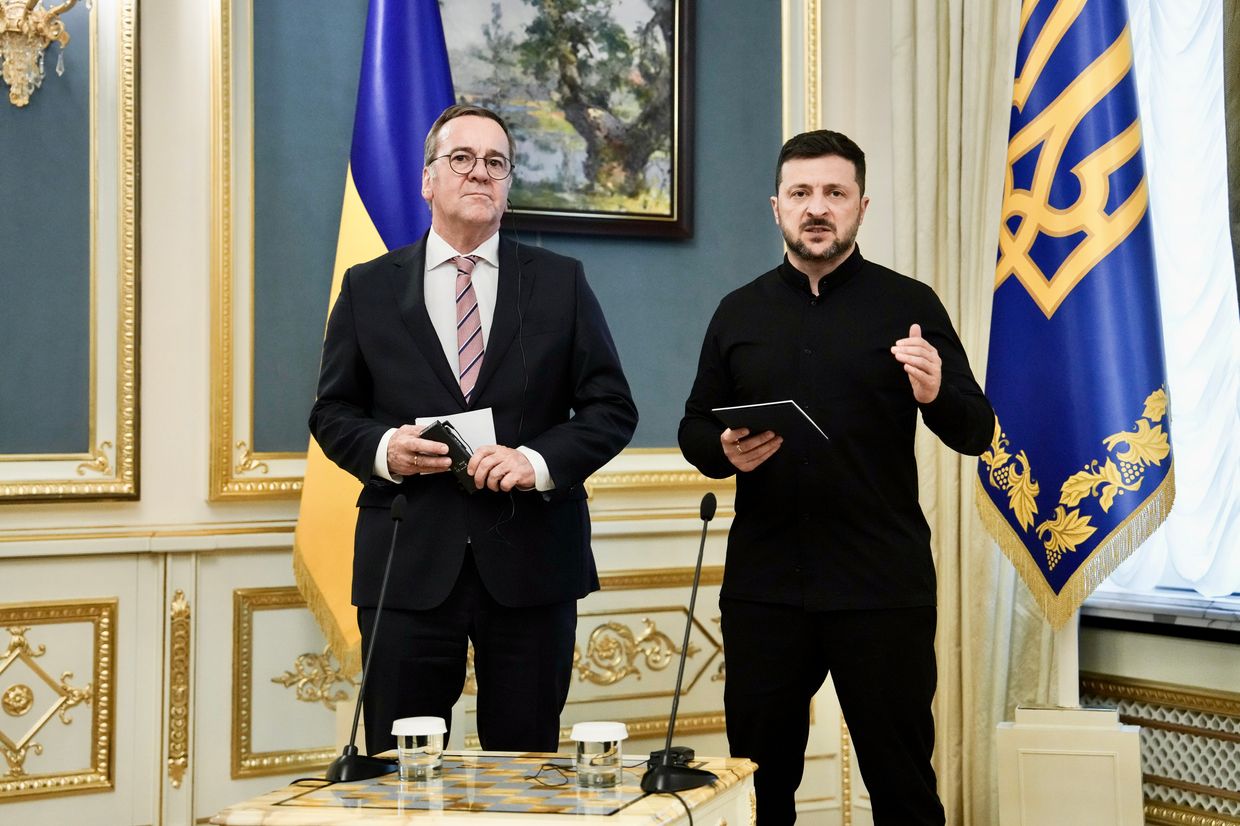Israel Pounds Gaza City as Fears Mount for Those Inside

© Saher Alghorra for The New York Times


© Saher Alghorra for The New York Times


© Miguel Riopa/Agence France-Presse — Getty Images
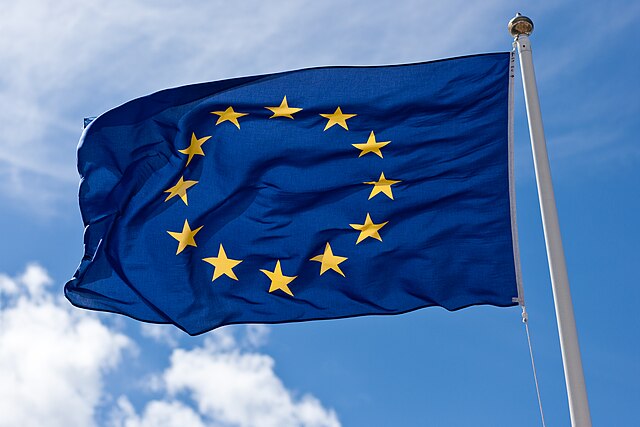

The European Commission announced a new €40 million humanitarian package to support Ukrainians as they head into a fourth winter of full-scale war.
Winters in Ukraine are harsh under normal circumstances, but the war has made them even more dangerous. Russia has repeatedly struck Ukraine’s energy grid in previous winters, knocking out electricity and heating for millions. These attacks have left entire cities in freezing conditions, with civilians often forced to endure long nights without light or warmth.
The EU says the new funding is focused on “strengthening the country’s preparedness for winter and protecting civilians against extreme cold.”
Hadja Lahbib, EU Commissioner for Equality, Preparedness and Crisis Management notes that “winter brings new hardships for millions of Ukrainians already suffering from the consequences of Russia’s war.”
Planned support includes providing shelter materials, repairing damaged homes and displacement centres, and improving access to heating, clean water, and sanitation.
These issues are especially pressing in winter months, when Russian strikes on infrastructure regularly disrupt living conditions and essential services.
According to the Commission, the aid will prioritize the most vulnerable groups: elderly people, children, people with disabilities, and displaced people living in collective housing.
This latest package adds to the EU’s broader humanitarian support for Ukraine, which has now reached several billion euros since the start of the invasion in 2022.
“The EU has channelled over 156,000 tonnes of relief supplies through its Civil Protection Mechanism. In response to the widespread destruction of Ukraine’s energy infrastructure, this support includes energy equipment such as 9,342 power generators, 6,917 transformers and millions of energy-saving LED bulbs. In parallel, the EU and its Member States have mobilised over €4.2 billion in humanitarian aid to Ukraine and neighbouring countries. The EU has also successfully coordinated the medical evacuation of more than 4,500 patients from Ukraine to hospitals across 22 European countries for treatment,” the European Commission said in its statement.


European Commission President Ursula von der Leyen announced a 6 billion euro ($7 bn) advance credit for Ukraine’s drone production, funded through profits from frozen Russian assets.
According to the European Parliament, Von der Leyen highlighted Ukraine’s success with drone warfare, saying that Ukrainian drone operations account for more than two-thirds of Russian equipment losses. “This is not just a battlefield advantage. This is a reminder of the power of human ingenuity in our open societies,” she said.
However, the Commission President warned that Russia is rapidly catching up with Iranian-developed Shahed-type drones and leveraging industrial mass production capabilities.
The EU leader emphasized the bloc’s potential to counter this threat through industrial capacity.
“We can help transform Ukrainian ingenuity into battlefield advantage – and into joint industrialization. That’s why I can also announce that Europe will advance 6 billion euros from the ERA credit and conclude a Drone Alliance with Ukraine,” von der Leyen declared.
She framed the initiative as addressing Ukraine’s scaling needs: “Ukraine has ingenuity. Now it needs scale. And together we can provide it: so that Ukraine maintains its advantage, and Europe strengthens its own.”
Von der Leyen also called for urgent development of new military financing solutions for Ukraine based on frozen Russian assets. In 2024, G7 agreed to provide Ukraine with a joint $50 billion loan backed by Russian assets, with funds formally issued as credit but repaid through revenues from frozen Russian assets. The European Union is set to transfer 18.1 billion euros ($21 bn) within this mechanism.
The Drone Alliance represents a shift from Ukraine’s initial drone warfare innovations to industrial-scale production, positioning European manufacturing capacity as a counterweight to Russia’s mass production advantages supported by Iranian technology transfers.


© Mindaugas Kulbis/Associated Press


© Oksana Parafeniuk for The New York Times


© Ksenia Kuleshova for The New York Times
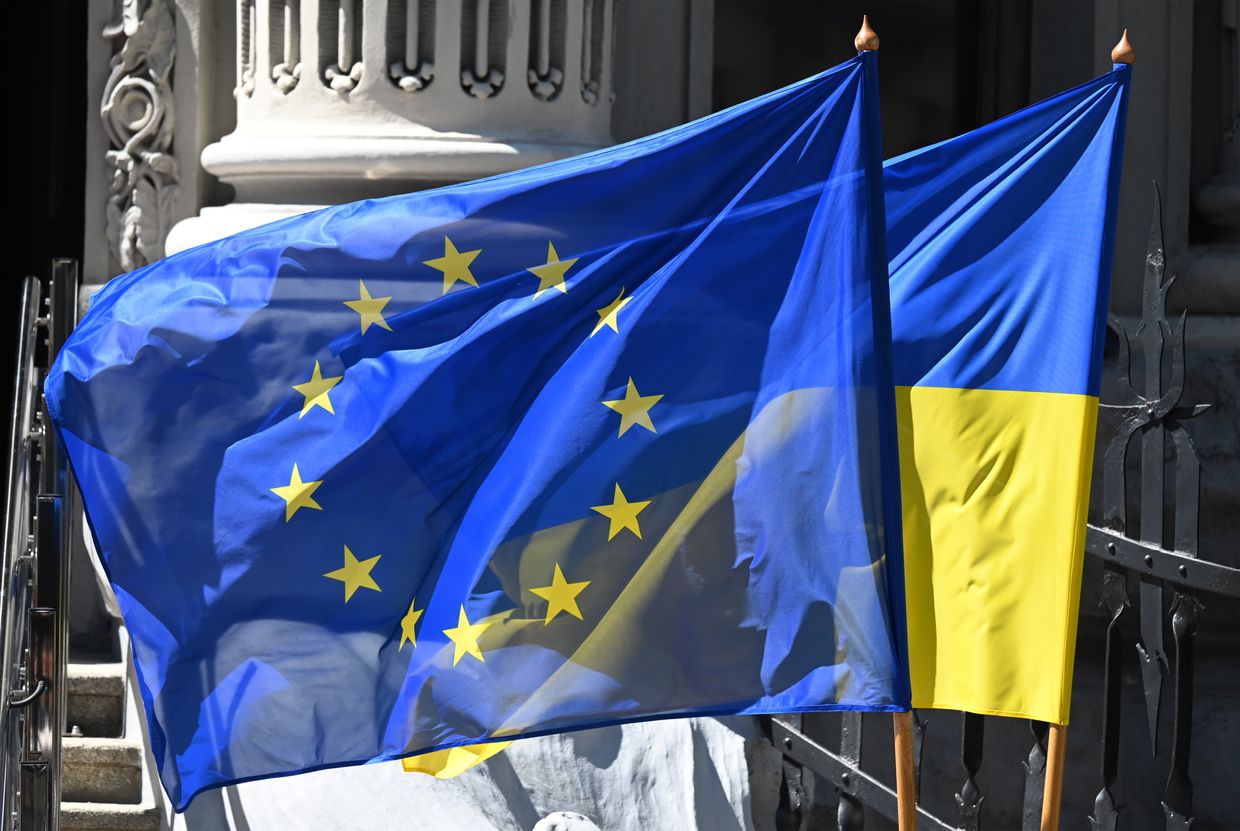

The European Union is considering establishing a fund for Ukraine worth 100 billion euros ($117 billion) in the next seven-year EU budget, Bloomberg reported on July 8, citing sources familiar with the proposal.
Sources told Bloomberg that the proposed funding, which is set to be presented later in July, would begin to be disbursed in 2028 as a means to provide additional assistance to the war-torn country amid waning U.S. support.
The proposal for an approximately 100 billion euro fund was previously touted by European Union Commissioner for Defense and Space, Andrius Kubilius, who called for the additional funding to be included in the seven-year EU budget in December 2024.
The fund, alongside other options, will be discussed before the Multiannual Financial Framework are released on July 16, according to Bloomberg.
Early in his second term as president, U.S. President Donald Trump repeatedly lambasted the EU for not providing an equal amount of support for Ukraine, urging the bloc to match spending on the war.
Since then, U.S. military and financial support have become unreliable, with contradictory statements coming out of the White House on additional military shipments in recent days.
On July 2 announced a halt in weapons shipments to Kyiv due to dwindling U.S. stockpiles, Trump later claimed he wasn't responsible for the decision and wanted to send more weapons to Ukraine.
Axios reported on July 8 that the White House is pursuing a plan to have Germany sell another Patriot battery to Ukraine, with the U.S. and European allies splitting the cost of the purchase. Sources told the outlet that Trump also pledged to send 10 Patriot interceptor missiles to Kyiv.
As support from the U.S. remains unpredictable, European countries are looking into additional ways to how it can continue to support Ukraine.
The proposed new funding agreement would follow previous support provided through the European Commission through grants and loans.
Since the start of Russia's full-scale invasion in February 2022, the EU has provided 160 billion euros ($187 billion) in aid to Ukraine. Along with Group of Seven (G7) countries, the EU has also provided loans as part of its $50 billion loan back by frozen Russian assets.
As Ukraine's budget deficit continues to grow amid the full-scale war, the European Commission is also discussing with EU member states separate options to help Kyiv sustain its economy, the Financial Times reported on July 8. The deficit could range from $8 billion to $19 billion in 2026.
 The Kyiv IndependentYana Prots
The Kyiv IndependentYana Prots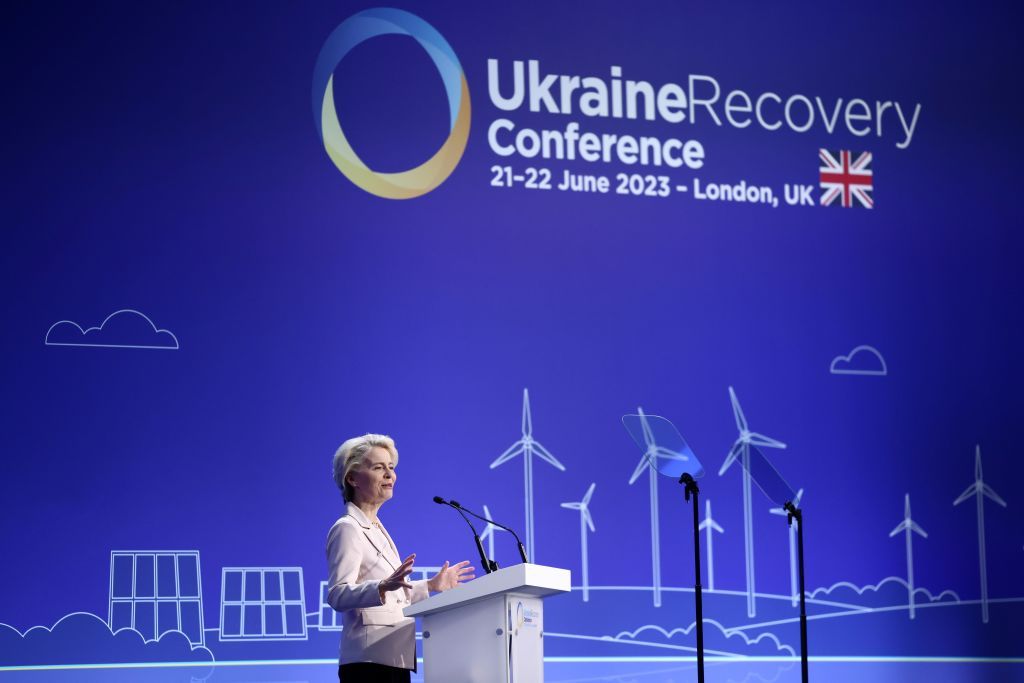
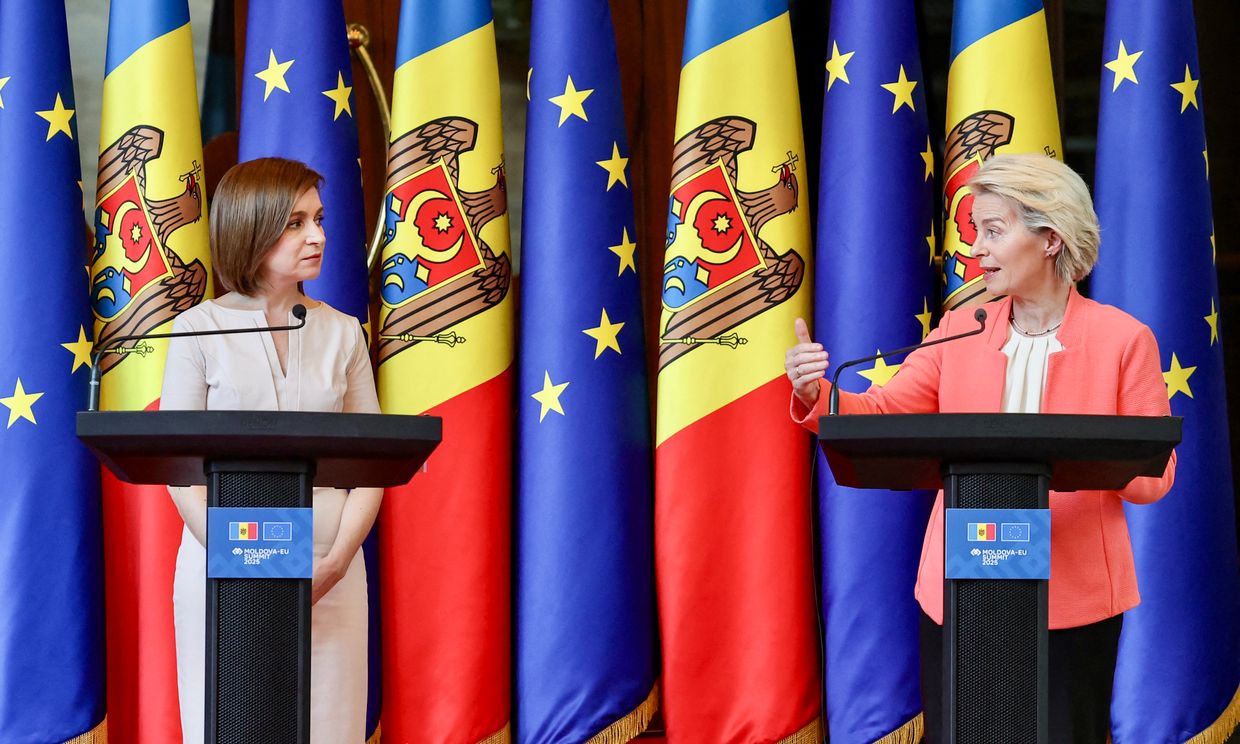

European Commission President Ursula von der Leyen pledged on July 4 that the European Union will help Moldova defend itself against hybrid threats by "agents of autocracy."
"We are committed to protecting you against the hybrid attacks and the energy shocks that your country has been a victim of," von der Leyen said following the EU-Moldova summit in Chisinau.
"Who is behind those attacks is clear to all of us here. These are the same agents of autocracy trying to undermine our democracies everywhere in Europe."
Von der Leyen praised Moldova's support for Ukraine and the EU, noting its acceptance of hundreds of thousands of Ukrainian refugees and its assistance with European wildfire response efforts.
The visit was made in show of solidarity with Moldova, one of Europe's poorest countries, as it prepares for high-stakes parliamentary elections on Sept. 28.
The pro-European government of President Maia Sandu faces a challenge from the pro-Russian Socialist Party, amid growing fears of destabilization ahead of the vote.
Sandu has accused Russia of using its military presence in Moldova's Russian-occupied Transnistria region to stir unrest and derail the country's EU aspirations. On June 12, she warned that Moscow could provoke a crisis in Transnistria to influence the election outcome.
Transnistria has been under Russian-backed separatist control since the early 1990s, with approximately 1,000 to 1,500 Russian troops still stationed in the region.
On June 11, Transnistrian authorities declared a 30-day state of emergency after a sharp drop in natural gas supplies. The unrecognized region has faced mounting energy shortages since January, when Russian energy giant Gazprom halted deliveries in what many see as an attempt to destabilize the situation in Moldova.
Moldova was granted EU candidate status in 2022. Sandu's ruling Party of Action and Solidarity aims to maintain its parliamentary majority and move the country closer to full membership by 2030.
Moldovan Prime Minister Dorin Recean earlier told the Financial Times that Russia plans to send 10,000 troops to Transnistria and establish a pro-Kremlin government in Moldova.
 The Kyiv IndependentTim Zadorozhnyy
The Kyiv IndependentTim Zadorozhnyy
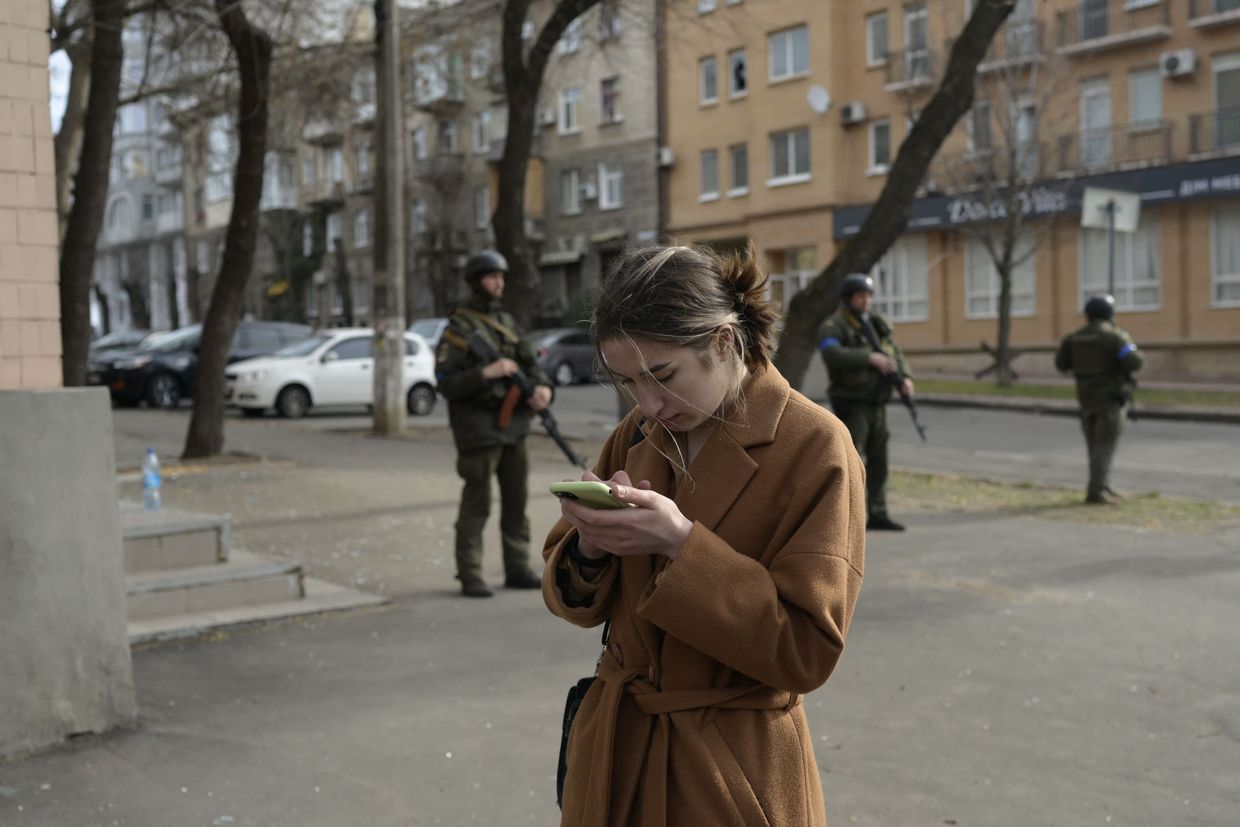

The European Commission has proposed that Ukraine join the European Union's mobile roaming area starting January 1, 2026, providing Ukrainian users the ability to make phone calls, texts, and use mobile data in the bloc's 27 countries at no extra charge.
"We want Ukrainian citizens to stay connected to their loved ones across the EU, as well as in their home country. That's why we propose that Ukraine join our roaming family," European Commission President Ursula von der Leyen said in a statement.
The proposal, first announced on June 16, will serve as a means of integration into the European Union's "Roam like at Home" provision in affect between all EU nations. The proposed change will impact the over four million Ukrainian refugees living in the EU.
Ukraine's full integration in the roaming provisions will replace voluntary measures that "allowed for roaming without surcharges and affordable international calls for EU and Ukrainian citizens abroad," according to the European Commission. The current measure will extend to December 31, 2025, ahead of the planned integration.
If approved, Ukraine will become the only country outside of the EU to join the bloc's "Roam like at Home" policy.
The move, which awaits European Council approval, comes as Ukraine continues to implement reforms in pursuing membership in the European Union.
Ukraine applied for EU membership at the onset of Russia's full-scale invasion in 2022. The country has made quick progress, achieving candidate status within months, with the initial negotiations formally launching in June 2024.
Since the start of 2025, Ukraine has opened three negotiation clusters under Poland's rotating presidency.
Poland lead the EU Council's presidency until June, and Denmark will take over the role in July. Ukraine aims to open the remaining three negotiation clusters in the second half of 2025 under the Danish chairmanship, the President Volodymyr Zelensky said.
There are six accession negotiation clusters, consisting of several individual chapters. Negotiations prepare a candidate country to become an EU member.
The EU’s Commissioner for Enlargement, Oliver Varhelyi, said that Ukraine could potentially join the bloc by 2029 if it successfully implements necessary reforms.
 The Kyiv IndependentVolodymyr Ivanyshyn
The Kyiv IndependentVolodymyr Ivanyshyn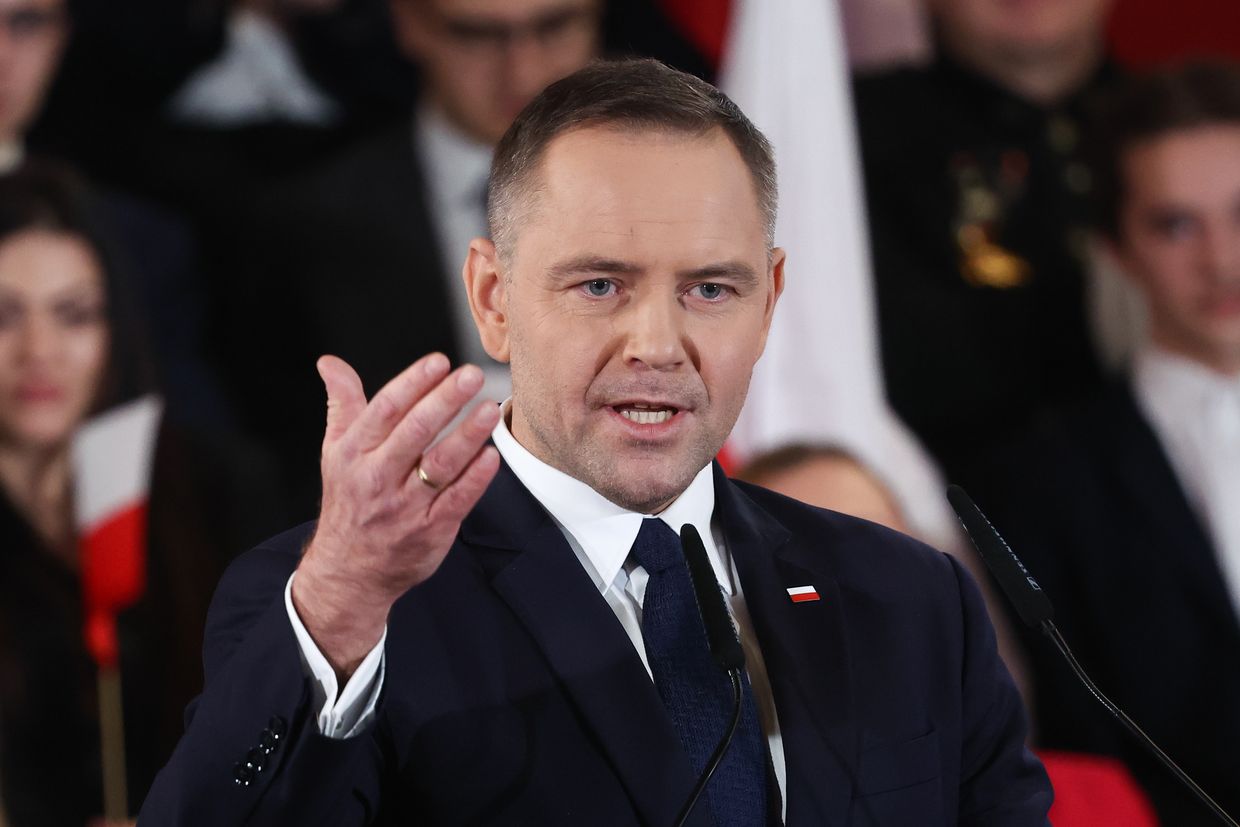
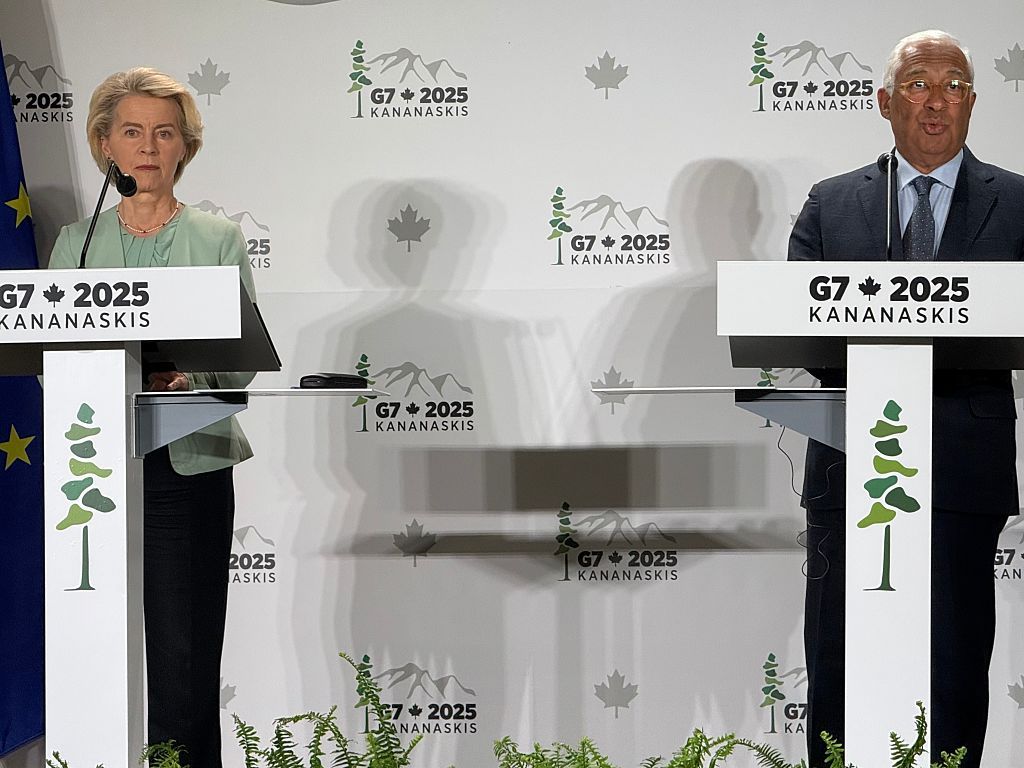

The Group of Seven (G7) nations need to impose harsher sanctions on Moscow in order to secure a ceasefire in the war against Ukraine, European Commission President Ursula von der Leyen and European Council President Antonio Costa said at the start of the G7 summit in Canada.
The G7 Leaders Summit kicked off on June 15 in Kananaskis, Canada, with official talks held June 16-17. While Ukraine hopes to win economic support and unified pressure against Russia, the rapidly escalating conflict between Israel and Iran may dominate this year's conference.
"To achieve peaceful strength we must put more pressure on Russia to secure a real ceasefire, to bring Russia to the negotiating table, and to end this war. Sanctions are critical to that end," von der Leyen said at a press briefing on June 15 attended by a Kyiv Independent journalist.
Economic sanctions have been an effective intervention since the start of Russia's full-scale invasion, von der Leyen said. She noted that combined G7 and European Union sanctions have decreased Russian oil and gas revenues by nearly 80% since February 2022.
"(T)he sanctions are working, and we will do more," she said.
Von der Leyen urged the G7 to adapt the economic restrictions proposed in the EU's 18th sanctions package, announced on June 10. The new measures target Russia's energy and banking sectors and propose a further reduction in the oil price cap, bringing the cap down from $60 to $45 per barrel.
"I will invite all G7 partners to join us in this endeavor," she said.
 The Kyiv IndependentKateryna Hodunova
The Kyiv IndependentKateryna Hodunova
Costa echoed the call for sanctions and the necessity of economic pressure in order to achieve a ceasefire. Europe is committed to "increasing additional sanctions to cripple (Russia's) ability to wage war and pressing for an unconditional ceasefire," he said.
Europe's call for unity may meet with resistance from the United States, which has assumed a dramatically different posture towards Ukraine and Russia since President Donald Trump took office in January. Trump has not imposed any new sanctions against Russia, even Moscow blatantly obstructs peace efforts and escalates mass strikes against Ukrainian cities.
The U.S. also reportedly opposes lowering the G7 oil price cap — a measure first introduced in December 2022 that prohibits Western companies from shipping, insuring, or otherwise servicing Russian oil sold above $60 per barrel.
The price cap debate has become more urgent as oil prices, which had fallen below the $60 cap in recent months, surged following Israel's recent strikes against Iran.
Despite U.S. resistance, the EU and the United Kingdom — backed by other European G7 countries and Canada — have said they are prepared to move forward with the proposal, even without Washington's endorsement.
President Volodymyr Zelensky, on the other hand, has said the EU sanctions and proposed price cap drop don't go far enough. Zelensky on June 11 said the EU's 18th round of sanctions "could be stronger" and proposed further slashing the oil price cap to $30 per barrel.
"A ceiling of $45 per barrel of oil is better than $60, that's clear, that's true. But real peace will come with a ceiling of $30," he said. "That's the level that will really change the mindset in Moscow."
Zelensky and Trump are expected to meet on the sidelines of the G7 summit on June 17. The meeting will mark their third in-person encounter since Trump took office.
 The Kyiv IndependentDmytro Basmat
The Kyiv IndependentDmytro Basmat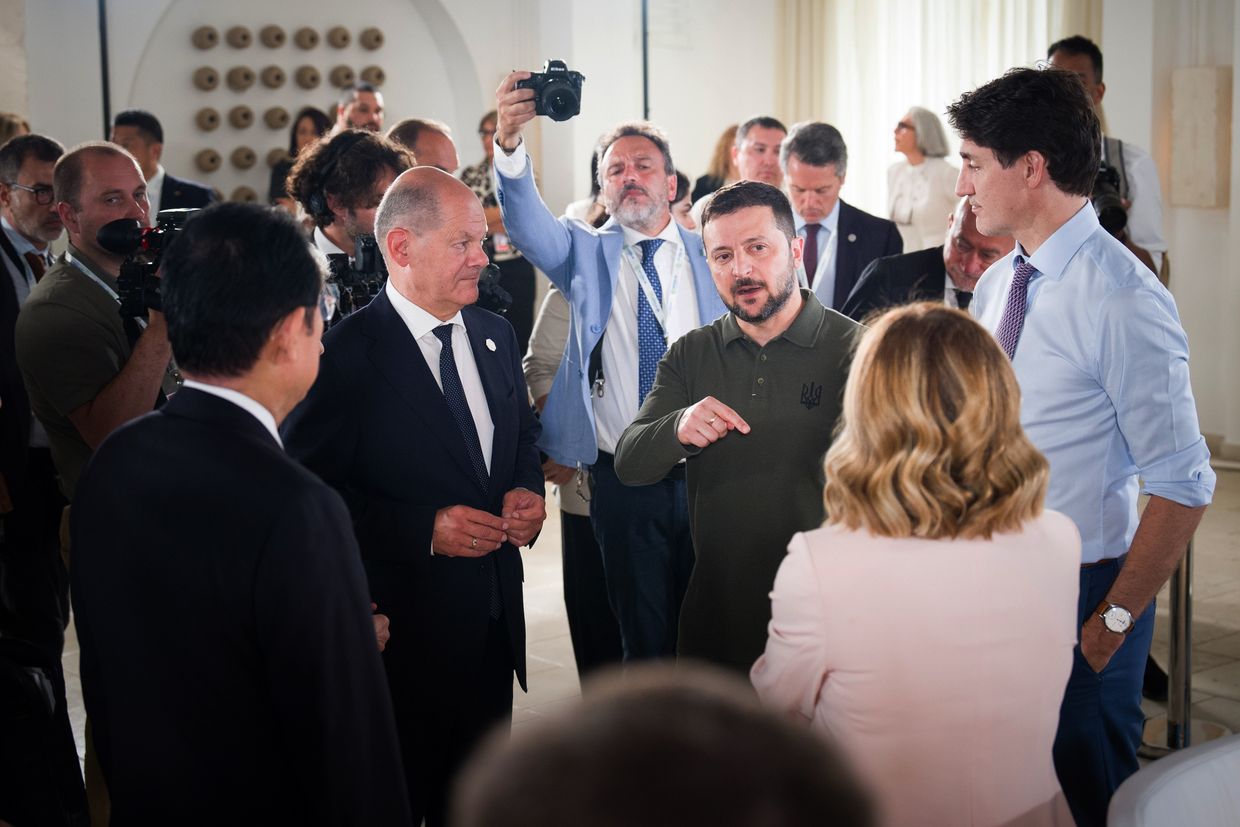
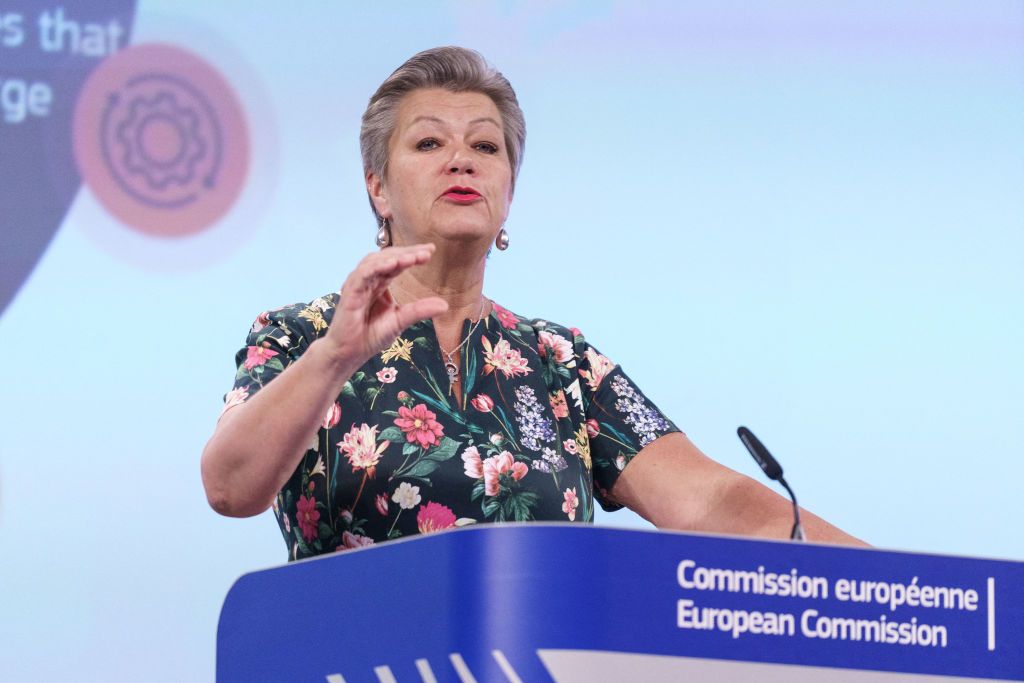

Ylva Johansson, former European Commissioner for Home Affairs, will serve as the European Union's new special envoy for Ukrainians in the bloc, POLITICO reported on June 12.
According to anonymous officials that spoke to POLITICO, Johansson will fill the newly created post, overseeing the Commission's long-term strategy for Ukrainian refugees currently residing in the European Union.
Johansson, a former Swedish minister and European Commission official, previously visited Ukraine on several occasions, including a refugee camp on the border with Romania. She received the Ukrainian order of merit in September 2024.
As special envoy, Johansson will be responsible for EU initiatives focused on helping Ukrainian refugees transition into permanent legal statuses or return home.
As part of these initiatives, the EU will launch "unity hubs" – information centers jointly managed with the Ukrainian government. The hubs will support Ukrainian refugees to integrate with EU host countries or repatriate to Ukraine.
Germany, which has has taken in more than 1 million Ukrainian refugees since the start of the full-scale invasion, recently committed to establishing unity hubs in Berlin. The unity hubs in Berlin will provide Ukrainians with access to educational and career opportunities both in Ukraine and Germany.
The European Commission also recently extended temporary protection Ukrainian refugees who fled to the EU following Russia's invasion of Ukraine.
According to Eurostat, 4.26 million Ukrainians currently hold temporary protection status in the EU as of April 2025.
 The Kyiv IndependentTim Zadorozhnyy
The Kyiv IndependentTim Zadorozhnyy